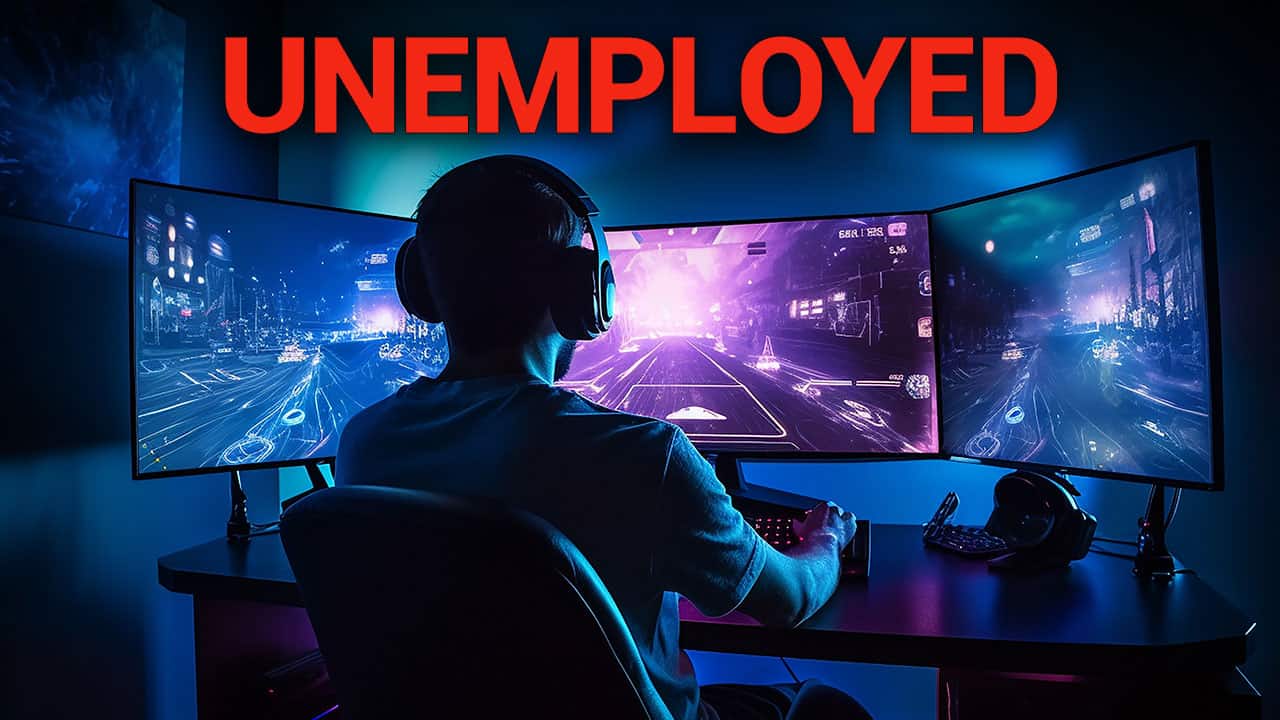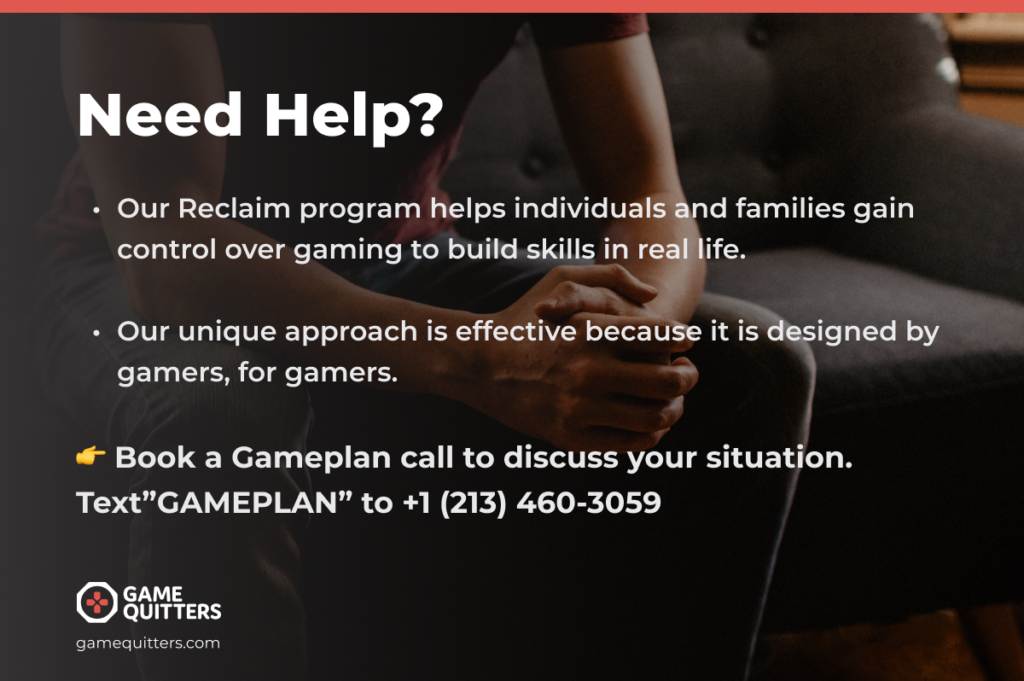
What to Do When an Adult Child Won’t Work (10 Tips)
Does your home feel like a battleground? Are you fed up with your adult child gaming obsessively rather than finding a job? Trying to motivate them to stop playing and start working can cause constant conflict, which is exhausting for the whole family.
At Game Quitters, we understand how frustrating it is to see other young people moving on in life while your adult child is holed up in their bedroom gaming night and day. In this article, we look at how to deal with video game addiction at different ages and give practical advice on what to do when an adult child won’t work.
The link between gaming and unemployment
Video games are no longer like Pong and Pac-Man. Today’s games are much more complex and visually appealing. However, they’re deliberately designed to be addictive, so gamers play for longer and spend money on loot boxes and other in-game purchases.
This era of 24/7 digital entertainment has another dark side that’s linked to video game addiction. It’s causing a decline in working hours by young men whose gaming is taking precedence over everything else, despite the problems it may cause in the short and long term.
Rising employment in young men is reflected in the Game Quitters community: 44% of our members are unemployed, 21% work part-time or casually, and only 35% are in full-time employment. The majority of our community are men aged 18–32, and 60% of them earn less than $500 each month.
So, how do you deal with difficult adult children whose lives are so consumed with gaming that they have no time for anything else?
Gaming addiction and joblessness at different ages

We’re regularly contacted by concerned parents asking, ‘How do I help my adult son who is struggling with gaming addiction and refuses to work?’ or ‘How do you deal with an unmotivated adult child who games all day and has no interest in a career?’
Before we share practical tips on how to help your adult child get a job, let’s look at how to deal with video game addiction at different ages.
20-year-old son won’t get a job
The prefrontal cortex—the area of the brain responsible for decision-making, judgment, and impulse control—doesn’t fully develop until the age of 25, which can make it difficult for young people to understand the importance of reducing their game play and looking for work.
While they may see no immediate need to go to college or get a job, they’ll soon get left behind if they don’t change their lifestyle. Getting gaming under control is the first step to getting their lives back on track. Once they start gaming less often, their brain will be less reliant on dopamine and more open to other activities, including work.
30-year-old son won’t get a job
It’s likely that 30-year-old gamers will have some previous job experience, even if it was part-time employment or casual work. However, as they reach their third decade, securing full-time employment is crucial to avoid a lifetime of limited opportunities and decreased wages.
Before this can happen, they must acknowledge and deal with their unhealthy gaming habits. Our video game addiction test will reveal whether they meet the criteria for problematic use. You can then introduce them to our three secrets of gaming addiction to help them regain control and start to thrive.
40-year-old son won’t get a job
By this age, gaming addiction may be deep-rooted and possibly linked to co-occurring mental health problems such as stress, anxiety, and depression.
The atmosphere at home is likely to be fraught, particularly if the adult child is making no contribution to the household, either financially or practically. There needs to be a two-pronged approach to help them achieve some life goals:
- Firstly, they should seek professional support from a mental health care practitioner who will be able to make a diagnosis and provide therapy to help them cope with difficult thoughts, feelings, and behaviors.
- Secondly, they need to address their video game addiction; otherwise, it will continue to hold them back from getting a job and becoming self-sufficient. As their problematic use is likely to be entrenched, specialist support may be required. At Game Quitters, we offer coaching programs for gamers and families that have helped others break free after years of struggling.
10 steps to getting a job

As you’re reading this article, you’ve probably reached the point where enough is enough. But how do you deal with an irresponsible adult child who still expects you to provide for him? Something has to change, and you can make it happen.
Here’s how to motivate your adult son to get a job and stop treating your home like a hotel:
- Explain they need to find a job that will provide an income so they can contribute to the household and make plans for a more exciting and independent future.
- Get them to buy into it by suggesting jobs that are more likely to appeal. Perhaps harness their passion for gaming and suggest jobs in the gaming industry or if social anxiety is an issue they could try remote work.
- If they’ve been out of the workplace for a while or never had a job, they may need to do training or volunteering to get some experience, but this will be a big step in the right direction.
- Offer support and advice throughout their job search. This may include:
- Helping them prepare a resume
- Brainstorming what types of jobs would be a good fit
- Encouraging them to register at an employment center, where they may be able to get job counseling
- Searching for employment opportunities online
- Identifying companies they can approach directly
- Offering to take them to job fairs and networking events
- Providing constructive advice on completing application forms and writing covering letters
- Practicing possible interview questions
- Get everyone else in the family to back your approach. It’s vital to show a united front. If someone is resistant to the idea, your adult child may take advantage and refuse to follow the plan.
- Set a realistic deadline for when they need to start paying rent and their share of bills, and stick to it.
- Discuss how to reduce their game play to free up time for job hunting, interviews, and working full time.
- Help them find new hobbies to replace video games, so they’re less tempted to reach for the gaming controller and improve motivation.
- Don’t enable your adult child in any way by renewing gaming subscriptions, paying for their car, ordering takeout food, doing laundry, cleaning their room, etc.
- If the deadline is approaching and they’ve made little effort to reduce their game play or look for work, explain that you will cut their internet connection and make your home a game-free zone after the agreed date.
Need help?

If you’ve tried the above tips to no avail, you may be considering when to give up on your grown child and ask them to move out.
Before you do that, please get in touch. We’ve helped hundreds of other adult gamers get their lives back on track, and we can help your loved one too.
Book a Gameplan call today. On this call, we’ll see if they’re a good fit for our coaching program. Instead of gaming all day, they’ll learn how to be more motivated and productive. We have limited spots available and are unable to accept all applicants.
